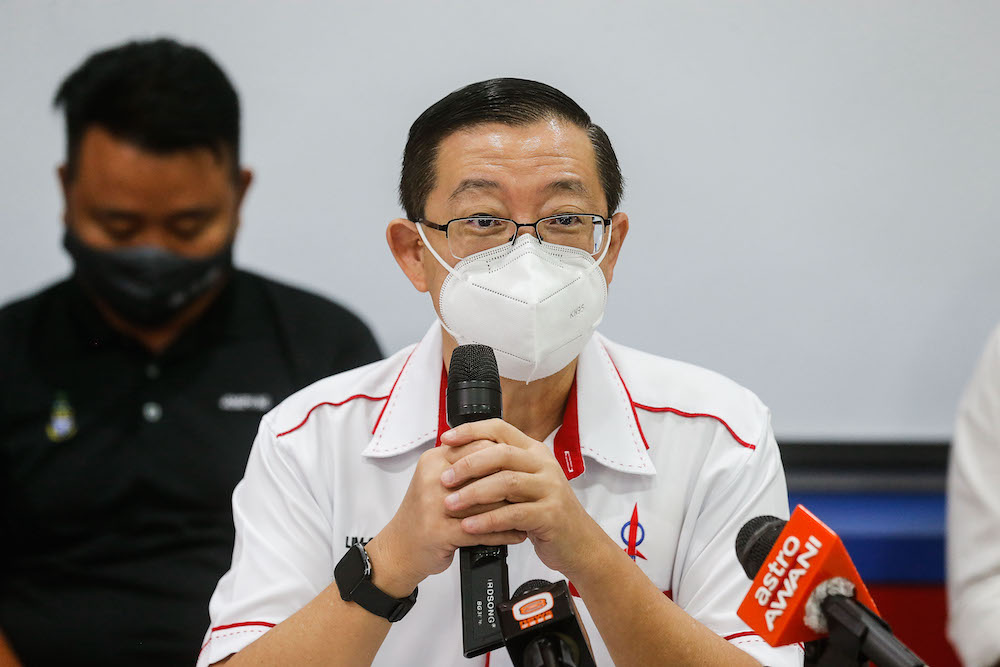KUALA LUMPUR, April 9 — Merely gazetting or making public the amount of additional spending by the government without going through Parliament during the Emergency period does not mean transparency and accountability is being upheld, DAP secretary-general Lim Guan Eng said today.
Lim, who was formerly a finance minister, today questioned Finance Minister’s Datuk Seri Tengku Zafrul Abdul Aziz’s April 7 remarks that the government is being transparent — especially throughout the Emergency period — through the requirement to announce all government expenditure through government gazettes.
Under a new law during the Emergency or the Emergency (Essential Powers) (Amendment) Ordinance 2021 introduced on March 31, the Finance Ministry was allowed to approve additional spending of the federal government’s funds beyond the initial Budget without going through the usual route of seeking Parliament’s approval, during the nationwide Emergency.
Lim, who is also Bagan MP, however said that the gazetting of government expenditure alone cannot substitute the role of Parliament in scrutinising and approving additional government spending.
“Merely publishing on the Federal or state government gazettes the amount of spending done under Emergency powers, is by no means tantamount to observing transparency or accountability. This makes a mockery of Parliament.
“What is required is full parliamentary debate that embraces the right of advice, dissent and consent by MPs performing their duty of parliamentary oversight and scrutiny on public spending,” he said in a statement today.
“Further, publishing the spending amounts approved on government gazettes is nothing new as the previous Supplementary Budgets would also be published on government gazettes. Just publishing spending amounts on government gazettes cannot supplant Parliament’s legislative authority,” he added.
Lim went on to say that DAP would not support or initiate any vote of no confidence in Parliament against Prime Minister Tan Sri Muhyiddin Yassin, if Parliament is reconvened before August 1. August 1 is currently the date when the Emergency is due to end.
Lim also said DAP leaders had given their assurances of full support if Parliament is reconvened to pass supplementary budgets for the government for Covid-19 spending.
“There is no need to use emergency powers to approve supplementary budgets when Parliament can still approve them after the Emergency expires on August 1, as long as it is done before December 31,” he added.
Lim also claimed the refusal to convene Parliament meetings amounts to an “act of treachery” by the Perikatan Nasional coalition against Parliament and the Federal Constitution.
“There is no reason why Parliament remains closed when business establishments, schools and even sports stadiums have opened. Further why can’t Parliament meet when all MPs have been vaccinated?” he said.
Lim went on to say that Parliament is the correct platform to check abuses of power, financial misappropriation and misuse of public funds for political purposes, noting as example the government’s slashing of the initial allocation of an RM85.5 million budget for the Jabatan Komunikasi Komuniti (J-KOM) — which is rebranded from the Special Affairs Department (Jasa) to RM40.5 million after protests from MPs.
On April 7, Tengku Zafrul stressed that the federal government and state governments need the flexibility to approve additional spending to address the Covid-19 crisis and its resulting economic impact.
Among other things, Tengku Zafrul had said the Finance Ministry has published a circular on procedures for supplementary spending during the Emergency, “which details the guidelines, governance on additional expenditure, as well as the processes for managing additional expenditure during the emergency period”.
Tengku Zafrul said such governance guidelines will ensure that additional allocation for the government’s spending is a “necessary expenditure”, and that the Federal Constitution and Financial Procedure Act 1957’s disallowing of government borrowings to fund operating expenditure meant that the government must ensure its operating expenditure does not exceed government revenue.
Noting that any additional spending by the government must still comply with existing rules and legislation, Tengku Zafrul had said: “In fact, through the requirement to announce all expenditure through gazetting, the government is being transparent and strives to ensure accountability and responsibility in implementing any expenditure, particularly throughout this emergency period.”
Tengku Zafrul also explained the usual process of approval for the federal government’s additional spending, saying that the Finance Ministry will typically approve the application for additional allocation in advance through the Contingency Fund, Contingency Reserves or Expenditure Authorisation Letter, before the Dewan Rakyat’s approval is obtained.
He noted as an example that additional spending by the Pakatan Harapan government in 2019 was only tabled by the Perikatan Nasional government in mid-2020 for parliamentary consensus and approval.
“Therefore, one of the purposes of amending this ordinance is to enable the speedy approval of additional expenditure for 2020, considering that the additional expenditure for 2020 had already been spent last year,” Tengku Zafrul had said of the Emergency law introduced on March 31.
He also said the Ordinance only touches on additional spending and not the preparation of the annual budget, which he said meant the federal government will present Budget 2022 or the government’s budget for next year in Parliament, in line with the Federal Constitution’s provisions.



















